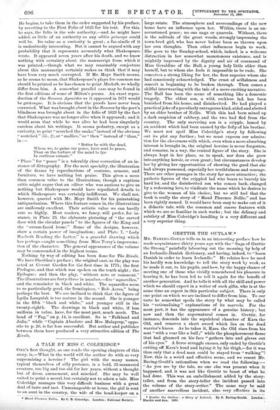A TALE BY MISS C. COLERIDGE.*
ONE'S first thought, as one reads the opening chapters of this story, is,—What in the world will the author do with so very
unpromising a heroine ? The girl with the many names, typical themselves of silly pretence, is a bold, ill-mannered creature, too big and too old for her years, without a thought but of dress, amusement, and mischief. She may be well suited to point a moral, but certainly not to adorn a tale. Miss Coleridge manages this very difficult business with a great deal of taste and tact. Unmanageable at home, the girl is sent to an aunt in the country, the wife of the head-keeper on a
• Maud Florence Nellie. By 0. B.. Coleridge. Loudon: National Society.
large estate. The atmosphere and surroundings of the new home have an influence upon her. Within, there is an un- accustomed peace; no one nags or quarrels. Without, there is the solitude of the great woods, strongly impressing the town-bred girl, who has never before been so thrown upon her own thoughts. Then other influences begin to work. She goes to the Sunday-school, which, indeed, is a welcome distraction in her somewhat monotonous existence, and is mightily impressed by the dignity and air of command of Miss Geraldine of the Hall, a young lady little older than herself, but to whom she feels it impossible to be rude. She conceives a strong liking for her, the first superior whom she had consciously acknowledged. The crust of selfishness and conceit is beginning to be broken through. Then comes a skilful interweaving with the tale of a more exciting narrative. The Hall has been the scene of something like a domestic tragedy. The eldest son, a wild, reckless lad, has been banished from his home, and disinherited. He had played a practical joke of a peculiarly outrageous kind, aided and abetted by an elder brother of Nellie. With this had been mixed up a dark suspicion of robbery, and the two had fled from the country. The only surviving son is a cripple, lamed by an accident which had been caused by the folly of his brother. We must not spoil Miss Coleridge's story by following out its plot any further ; but we must express our admira- tion for the cleverness with which, even when a more absorbing interest is brought in, the original heroine is never forgotten, and remains, in a way, the central figure of the story. She is always kept in her place, so to speak, nor does she grow into anything heroic, or even great ; but circumstances develop her by giving her opportunities of showing the good that she had always possessed, especially her truthfulness and courage. There are other passages in the story far more attractive; the pathetic figures of the crippled lad who bears so bravely his hard lot, and the disinherited son who comes back, changed by a redeeming love, to vindicate the name which he desires to give to the woman of his choice ; but we still feel that the book is really the story of "Maud Florence Nellie," and has been rightly named. It would have been easy to make out of it a didactic tale, with the common and coarse features with which we are so familiar in such works ; but the delicacy and subtlety of Miss Coleridge's handling is a very different and a very superior thing.


















































 Previous page
Previous page